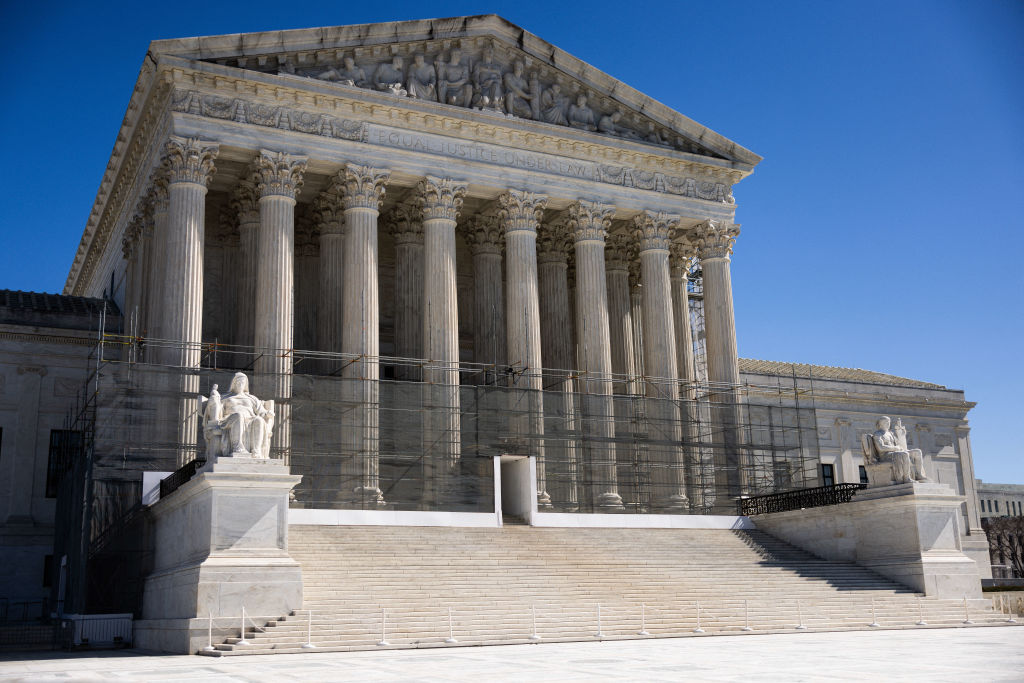Trump asks Supreme Court to allow deployment of National Guard in Illinois


The Trump administration on Friday afternoon asked the Supreme Court to pause an order by a federal judge in Illinois that bars the federal government from deploying the National Guard to Illinois. U.S. Solicitor General D. John Sauer told the justices that the order by U.S. District Judge April Perry “cause[s] irreparable harm to the Executive Branch by countermanding the President’s authority as Commander in Chief, jeopardizing the lives and safety of DHS officers, and preventing the President and the Secretary of War from taking reasonable and lawful measures to protect federal personnel from the violent resistance that has persisted in the Chicago area for several months.” Sauer also asked the court to issue “an immediate administrative stay to prevent ongoing and intolerable risks to the lives and safety of federal personnel while this Court considers this application.”
The Supreme Court instructed the challengers in the case – the state of Illinois and the city of Chicago – to file their response by 5 p.m. EDT on Monday, Oct. 20, signaling that the justices could act quickly on the government’s request.
Sauer described the dispute as an example of “what has become a disturbing and recurring pattern: Federal officers are attempting to enforce federal immigration law in an urban area containing significant numbers of illegal aliens. The federal agents’ efforts are met with prolonged, coordinated, violent resistance that threatens their lives and safety and systematically interferes with their ability to enforce federal law,” prompting the president to determine “that he is unable to enforce the laws of the United States with the regular forces and call[] up the National Guard to defend federal personnel, property, and functions in the face of ongoing violence.”
In this case, Sauer continued, “federal officers in Chicago have been threatened and assaulted, attacked in a harrowing pre-planned ambush involving many assailants, rammed in their government vehicles, shot at with fireworks and other improvised weapons, injured and hospitalized, and threatened in person and online.” President Donald Trump, having “determined that the situation in Chicago had become unsustainably dangerous for federal agents,” on Oct. 4 called up 300 members of the Illinois National Guard and deployed them.
U.S. District Judge April Perry on Oct. 9 issued a temporary restraining order that barred the Trump administration “from ordering the federalization and deployment of the National Guard of the United States within Illinois” until Oct. 23. In an opinion on Oct. 10 to accompany her order, Perry questioned the Trump administration’s version of events. She noted that although she did “not doubt that there have been acts of vandalism, civil disobedience, and even assaults on federal agents,” she could not conclude that declarations by federal officials to support the government’s assertions “are reliable.”
Perry rejected the suggestion that the situation in Chicago amounted to the kind of “danger of rebellion” that would allow Trump to call up the National Guard under federal law. “The unrest Defendants complain of has consisted entirely of opposition (indeed, sometimes violent) to a particular federal agency and the laws it is charged with enforcing” – which does not amount, she concluded, to “opposition to the authority of the federal government as a whole.”
Nor, Perry continued, was Trump justified in calling up the National Guard because he was “unable with the regular forces to execute the laws of the United States.” “Here,” she wrote, “Defendants have made no attempt to rely on the regular forces before resorting to federalization of the National Guard, nor do Defendants argue (nor is there any evidence to suggest) that the President is incapable with the regular forces of executing the laws.”
Perry scheduled another hearing for Oct. 22 to determine whether to extend her order.
The Trump administration appealed to the U.S. Court of Appeals for the 7th Circuit, which on Thursday issued an unsigned opinion in which it allowed the portion of Perry’s order barring the deployment of the National Guard to stay in place but paused the part of the order prohibiting the federalization of the National Guard. The court of appeals acknowledged that Trump is entitled to “a great level of deference” regarding his determination that the conditions to federalize and deploy the National Guard are present. But even then, it said, Perry’s decision that there is no “danger of rebellion” should stand. “The spirited, sustained, and occasionally violent actions of demonstrators in protest of the federal government’s immigration policies and actions, without more, does not give rise to a danger of rebellion against the government’s authority.” Similarly, the court continued, “there is insufficient evidence that protest activity in Illinois has significantly impeded the ability of federal officers to execute federal immigration laws.”
One day later, Sauer came to the Supreme Court, asking the justices to intervene. He contended first that only the president, and not federal courts, can decide whether the conditions for federalizing the National Guard have been met. But in any event, Sauer continued, Trump’s reliance on federal law to call up the National Guard “was lawful and consistent with a long historical tradition, tracing back to President Washington’s response to the Whiskey Rebellion, of relying on the Armed Forces and the militia to assist in responding to violent resistance to federal law enforcement.” Perry’s order also “improperly impinges on the President’s authority and needlessly endangers federal personnel and property,” Sauer concluded.
The Trump administration has also deployed National Guard troops to Portland, Oregon. U.S. District Judge Karin Immergut issued a temporary restraining order blocking that deployment; the Trump administration has appealed that ruling to the U.S. Court of Appeals for the 9th Circuit.
Posted in Court News, Emergency appeals and applications
Cases: Trump v. Illinois